For the last four editions of the men’s World Cup, there has been one constant: a European champion.
Ever since Brazil won its record fifth title in 2002, it has become the UEFA invitational, with Italy, Spain, Germany and France claiming the subsequent World Cup titles in succession. There’s no shortage of European contenders this time around. France, despite all of its injuries and question marks, remains—on paper, anyway—a legitimate candidate to become the first repeat champion since 1962. Germany has reloaded, while Spain took a step forward during Euro 2020 and appears poised to build upon it.
England has been ripe for the picking of late, but it has made at least the semifinals in each of its last two major tournaments under Gareth Southgate, while Croatia and Belgium enter as the reigning silver and bronze medalists, respectively.
Nevertheless, if our picks are to come to fruition, it’ll be one of two South American sides lifting the trophy all while the European contenders, for a change, are the ones left to watch what could have been.
Here are Sports Illustrated’s expert picks and predictions for who will get through the group stage to the knockout bracket—and which nation will persevere from there to win the 2022 World Cup. As a refresher, here are the groups for the competition:
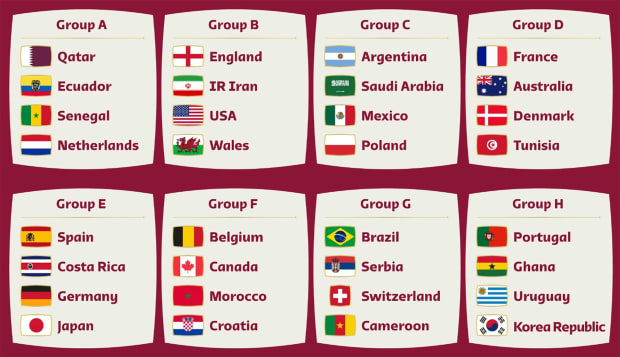
FIFA
AVI CREDITOR
Group Winners: A - Senegal | B - England | C - Argentina | D - Denmark | E - Spain | F - Belgium | G - Brazil | H - Uruguay
Group Runners-Up: A - Netherlands | B - USA | C - Mexico | D - France | E - Germany | F - Canada | G - Serbia | H - South Korea
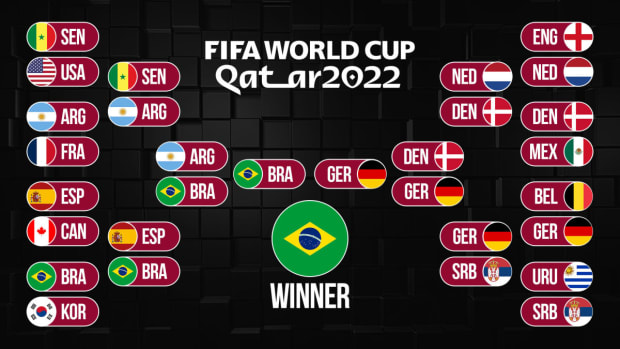
One would think that 20 years of European dominance would be a deterrent, but here's the first of many votes for a South American power. Like in 2018, the “real” final will come in the semis, with this time it being rivals Brazil and Argentina dueling in a classic. To get there, Messi & Co. will return the favor for reigning champion France—a runner-up to Denmark—in the round of 16 after a reverse result in that round four years ago.
As for some moderate group-stage surprises, Canada will make good on its return to this stage for the first time in 36 years by denying 2018 runner-up Croatia a knockout place, while South Korea will abruptly end Cristiano Ronaldo’s World Cup career by pipping Portugal to a last-16 spot on the last day of the group stage.
As for the most predictable thing in this tournament, Mexico will get back to the round of 16—and promptly lose. Fool me once, shame on you. Fool me seven straight times ...
But in the end, it’s Brazil returning to glory, ending a 20-year wait with a win over a resurgent Germany in a proper final, where revenge for 7–1 is finally exacted (the 2016 Olympic final was nice and all, but it’s no eye-for-an-eye measure for that). The Seleção have solved their problem of being too Neymar-dependent, and while the PSG star will break Pelé’s all-time national scoring record at the tournament, the talk of Qatar will be young Real Madrid stars Vinícius Júnior and Rodrygo and the budding of another Brazilian dynasty.
ANDREW GASTELUM
Group Winners: A - Netherlands | B - England | C - Argentina | D - France | E - Germany | F - Belgium | G - Brazil | H - Uruguay
Group Runners-Up: A - Senegal | B - USA | C - Poland | D - Denmark | E - Spain | F - Croatia | G - Switzerland | H - Portugal
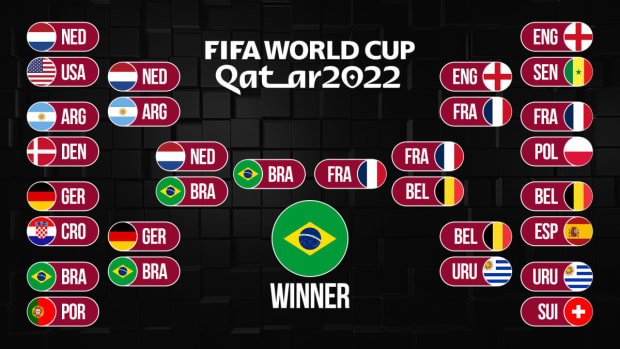
All signs point to this being Brazil’s World Cup to lose, which it very well could do given all the pressure the team is under. But other than France, Brazil enters as the most complete and balanced squad in the tournament, and without the baggage that Les Bleus are bringing with them to Qatar. Brazil’s attack is teeming with talented options that could give it a new formidable front three for every group-stage match and still see it compete for the title. And despite a lack of its usual star power at fullback, Brazil has a solid defensive unit led by Thiago Silva and Marquinhos and with Casemiro roaming as a safeguard in midfield. Tite’s ride into the sunset as manager should end Brazil’s 20-year drought and enshrine this squad in Brazilian lore. However, Brazil will truly have to earn it in the knockouts with a round-of-16 matchup against Uruguay or Portugal looming and with dates against either Germany or Spain and Argentina potentially along the road to the final.
On the other side of the bracket, I wouldn’t be surprised to see Belgium make waves in its golden generation’s last run at the World Cup—and a potential 2018 semifinal rematch against France provides a chance at redemption. But the team that I expect to make the biggest splash is the Netherlands. In Louis van Gaal’s latest stint as manager, the Dutch have yet to lose—which includes eight games against World Cup–bound opponents in the last year—and come into Qatar with one of the most organized defensive setups in the competition.
Still, this is Brazil’s tournament.
Watch the 2022 World Cup with fuboTV: Start your free trial today!
MARCUS KRUM
Group Winners: A - Senegal | B - England | C - Argentina | D - Denmark | E - Spain | F - Belgium | G - Brazil | H - Uruguay
Group Runners-Up: A - Netherlands | B - USA | C - Mexico | D - France | E - Germany | F - Croatia | G - Switzerland | H - Portugal
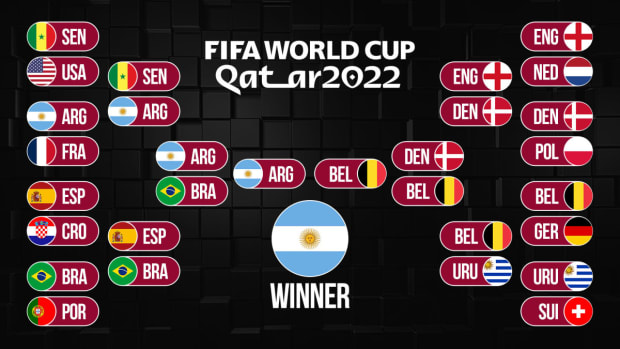
The curse of the defending World Cup champions continues! Four of the last five winners have been eliminated in the group stage at the following tournament. While 2018 champion France is too talented for that, off-field drama leading up to Qatar and some key injuries see Les Bleus finish second in Group D behind surging Denmark. Don’t worry, Mexico fans. Your curse of losing each year just before the quinto partido will be broken—El Tri, battling injuries and poor form of its own, won’t make it out of the group for the first time since 1990.
The French get bounced by Messi’s Argentina in the round of 16. The Danes, fresh off a shock charge to the Euro semifinal, take Christian Eriksen’s return and run with it all the way to the semis again. Ultimately, Argentina has manufactured an excellent team around its talismanic No. 10. The team trusts in manager Lionel Scaloni after he led it to its first Copa América title since 1993. Brazil will provide an electric semifinal matchup, but the Albiceleste will get the job done as this year’s team of destiny in Messi’s final World Cup.
BRIAN STRAUS
Group Winners: A - Netherlands | B - England | C - Argentina | D - Denmark | E - Spain | F - Belgium | G - Brazil | H - Uruguay
Group Runners-Up: A - Senegal | B - USA | C - Poland | D - France | E - Germany | F - Croatia | G - Serbia | H - Portugal
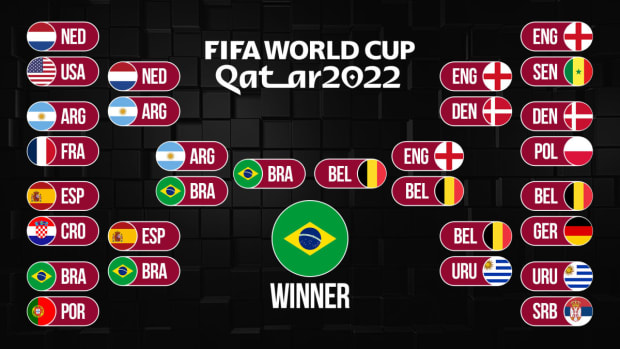
Europe has reigned over the World Cup since the last time it was played in Asia (2002). The past four winners, not to mention 11 of 12 medalists, have been from UEFA. But a winter World Cup in Qatar feels like a fitting place for a hitch in the established order. None of Europe’s traditional heavy hitters are at their peak this month, especially reigning champion France. Spain looks like it’s a cycle away from true contention, Germany and England are stumbling toward Qatar, and Italy missed its flight. So it seems like the right time for the old order to reassert itself.
Brazil is always a favorite and a threat. Picking the Seleção might be lazy, and the field is still the best bet in Qatar. But Brazil looks like the most likely champion. It’s hitting its stride, unbeaten in 15 and with one defeat in the past three years. And it’s loaded with European trophy winners in their prime—including, at last, Neymar, who’s been playing like he’s finally ready to reach his World Cup potential.
Belgium will benefit from a forgiving bracket and, with less wear and tear on its aging golden generation thanks to the tournament’s timing, finish second. Leo Messi and Argentina will recover from an epic semifinal against Brazil to take bronze.
JONATHAN WILSON
Group Winners: A - Netherlands | B - England | C - Argentina | D - France | E - Spain | F - Croatia | G - Brazil | H - Uruguay
Group Runners-Up: A - Senegal | B - USA | C - Poland | D - Denmark | E - Germany | F - Belgium | G - Serbia | H - Portugal
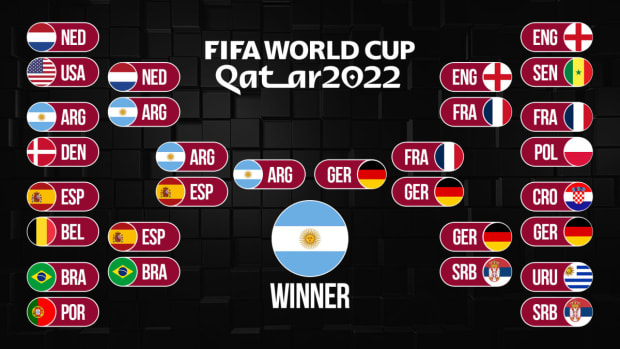
The last four World Cups have been a story of European domination: It's not just that all four winners have been European, but 13 of the last 16 semifinalists have been as well. The wealthy nations of western Europe have all invested heavily in youth development, and young players coming through those revamped academies have the enormous advantage of easy and immediate access to the highest level of club football, playing with and against the best, under the best coaches and in the best facilities. There will always be blips and exceptions, stronger or weaker generations and moments of ill-luck of mismanagement, but it’s hard to see that trend changing soon.
However, there are a number of complicating factors this time around. Nobody will be properly prepared. The schedule, partly because of COVID-19 and partly because of a November tournament, has been unusually compact. Injuries and fatigue will play a major role. And both Brazil and Argentina are in good form, settled under popular coaches. Both are on long unbeaten runs, but neither, in part because of COVID-19 and in part because of the Nations League, has played many European sides since the last World Cup, raising a doubt as to how good they really are. Given all the random factors, this is an unusually difficult tournament to predict.







